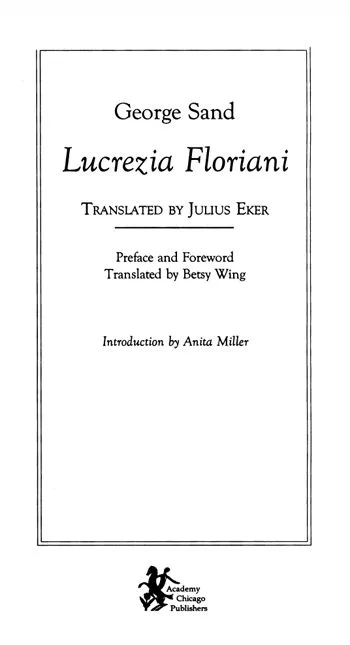Lucrezia Floriani

Published in 1993 by
Academy Chicago Publishers
363 West Erie Street
Chicago, Illinois 60610
Translation copyright © 1985 by Anna Eker.
Preface and foreword translation
copyright © 1985 by Betsy Wing.
Introduction © 1985 by Anita Miller.
Printed and bound in the USA
First hardcover edition published by Academy Chicago: June, 1985
First paperback edition: October, 1993
No part of this book may be reproduced
in any form without the express
written permission of the publisher.
Library of Congress Cataloging in Publication Data
Sand, George, 1804-1876
Lucrezia Floriani.
I. Title.
PQ2407.L913 1985 843’.7 95-3876
ISBN 0-89733-397-7 (paperback)

Introduction
In the spring of 1846, when George Sand was forty-two years old, she had been legally separated for ten years from her husband, Casimir Dudevant, and was living at Nohant, the country estate she had inherited from her grandmother, with her two children, Maurice, then twenty-two years old, and her daughter Solange, eighteen. Frederic Chopin, the Polish composer, lived at Nohant as well: he was then thirty-six years old, and suffering from the disease which was to kill him in three years. He had been Madame Dudevant’s guest since they had spent the winter together, with the children, in Majorca in 1838.
By 1846 George Sand’s relationship with Chopin had deteriorated badly, and it was in the spring of that year that she began to write Lucrezia Floriani. Consequently the novel created a minor scandal: word had gotten out well before publication that the neurotic Prince Karol was obviously Chopin, and that Lucrezia herself was the author, thinly disguised. Chopin had not seemed to recognize himself in parts of the novel which were read aloud to guests at Nohant, and the author stoutly denied that the book was anything but a fabrication. Nevertheless the protagonists were clearly recognizable, and in fact Chopin left Nohant in 1846 because of a quarrel with Maurice, and was never to return.
The appearance of Lucrezia Floriani was deplored by George Sand’s friends and added fuel to the fires of her enemies, who were legion. Madame Dudevant was, after all, an avowed socialist, a woman who used a man’s name, had worn men’s clothing, smoked cigars, was separated from her husband, and had had frequent passionate love affairs. She was much admired as a writer, but her life and much of her writing were considered outrageous by the moral and religious standards of the time.
If George Sand’s work and personal life upset the French, one can imagine the reaction to both in the England of Victoria and Albert. She was however read in the original by most Victorian writers and especially admired by the Brownings, Charlotte Bronté, George Eliot, Matthew Arnold, John Stuart Mill and Jane Carlyle, although Thomas Carlyle disliked her work intensely, as did John Ruskin. Despite the obviously controversial nature of her work, the first English translation of it appeared in 1842: Spiridion, a novel concerned with religion, which had been published in France three years earlier. Thereafter, through the decades, Sand translations appeared of those works, at least, which would not offend the eyes of clergymen and other protectors of the innocent. Indiana, published in French in 1832, and concerned with flaming passion outside a loveless marriage, appeared first in English in 1850, not in England but in America.
Despite this rather tepid spate of translations, influential journals thundered from the right against the French writer. Thackeray wrote an article deploring her attitudes toward marriage. It was not until 1902 that many of the novels which scandalized the Victorians (Indiana, Valentine, Leone Leoni, She and He, etc.) were finally published in good English translations. And Lucrezia Floriani, obviously, was not among them.
And indeed, even in 1902 Lucrezia would be a shocking book. An actress, never married, with a family of children with different fathers … a woman from the lower rung of society, whose father lives on her estate … a woman who has a love affair with a nobleman several years her junior … and for whom, despite all this, we must feel respect, sympathy and affection. It was too much. And through all this, the sharp intelligence which watches everyone, and especially Prince Karol, and notes reactions and attitudes with a psychological insight which appears no less admirable today than the day it came first to public notice. A remarkable, and in some ways, a pitiless book.
When society had changed sufficiently so that Madame Dudevant no longer shocked and upset the bourgeoisie, she had come to appear old-fashioned and even unimportant. In the male-oriented establishment of English letters, her obvious influence on some of the greatest English writers was ignored or unknown. It was not until an excellent British television series based on her life was broadcast in the early seventies that people began to hunt her up in libraries (where for the most part she could not be found in English), that feminists rediscovered her, and work was begun to give her her proper place in the history of literature.
Anita Miller
Preface
There is no need for me to state here the literary ideas that influenced me in writing this novel, because it has a foreword summarizing my opinions at the time, and because these opinions have not changed. But I am anxious to be explicit about something I only mentioned in that foreword in regard to contemporary productions whose form I criticized and example I rejected.
It is not false modesty, even less a faint-hearted nature, that makes me say I like romantic events very much in a novel — the unforeseen, intrigue, action. For the novel, as for the theatre, I should like someone to find a way to unite dramatic movement with real analysis of characters and human sentiments. Without wishing now either to criticize or praise anyone, it is my opinion that this problem has usually not been completely resolved either for the novel, or for the theatre. For twenty years we have been hesitating between the two extremes, and I have, for my part, liking strong emotions in fiction, nonetheless gone to the other extreme, less through inclination than consciously, because I saw this direction was neglected and abandoned by the current fashion. I tried my hardest, without exaggerating either the weakness or importance of my efforts, to keep the literature of my time on a practicable path between the peaceful lake and the wild torrent. My instinct would have sent me towards abysses. I still sense this in the interest and impetuous eagerness with which my eyes and ears seek out drama; but when I am back once again with my thoughts assuaged and satisfied, I do as all readers and spectators do; I reconsider what I have seen and heard, and ask myself why and how the action moved me and carried me along. Then I notice things that are suddenly implausible or inadequate causes for events driven along before the torrent of imagination, regardless of any obstacle of reason or moral truth.
1 comment